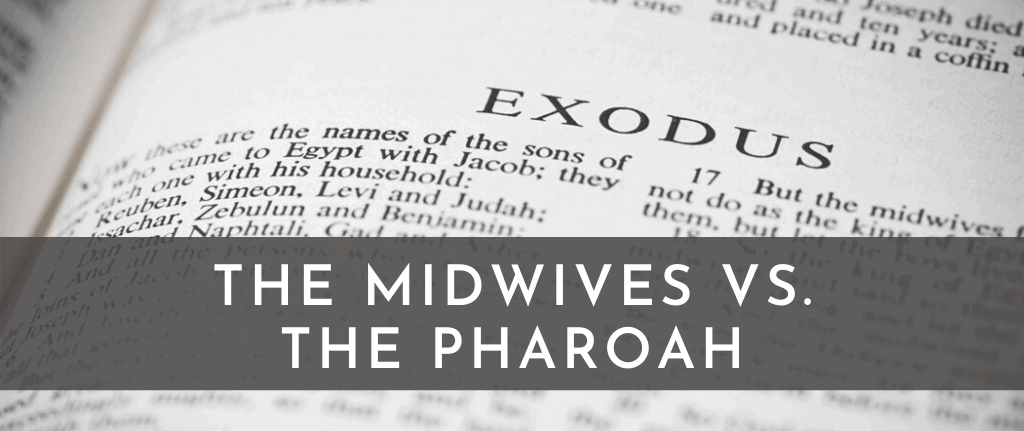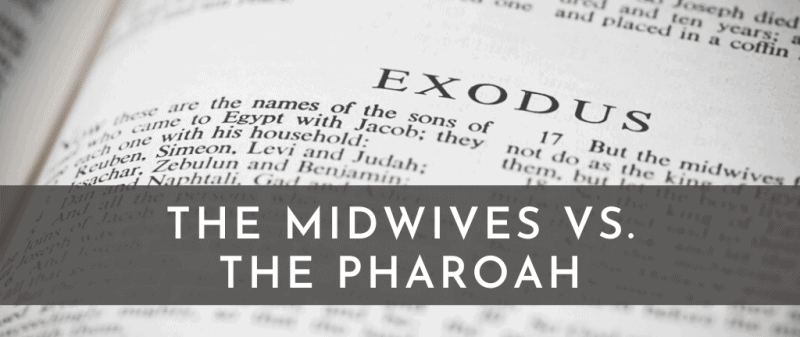People go to great lengths to display their social importance.
Displays of power transcend culture. And power is the main concern of a scene in Exodus 1 that occurs between Pharaoh and two Hebrew midwives, Shiphrah and Puah. Exodus 1:15-21 poses a question of power. It offers a contrast of opposites.
It asks us as readers to consider, “Wherein does true power reside?”
The Shiphrah and Puah Narrative in Exodus 1:15-21
The following is my translation of Exodus 1:15-21 from the Hebrew:
16 And he said, “When you midwife for the Hebrew women and you see upon the birthing stool if it’s a boy, you shall kill him and if it’s a girl, she shall live.
17 And the midwives feared God and they did not do as the king of Egypt had spoken to them but they let the boys live.
18 And the king of Egypt called for the midwives and he said to them, “Why have you done this thing that the boys yet live?
19 And the midwives said to Pharaoh, “The Egyptian women are not like the Hebrew women, who are lively; they give birth before the midwife gets to them.”
20 And God was good to the midwives and the people became great and very numerous.
21 And because the midwives feared God, He established houses for them.
The Midwives meet Pharaoh: A Contrast of Opposites
This passage presents a contrast of characters who are opposites in almost every respect:
There is a contrast of genders: Pharaoh was male whereas the midwives were females.
There is a contrast of ethnicity: Pharaoh was Egyptian and the midwives were Hebrews.
There is a contrast of status: Pharaoh was a king and the midwives were servants.
All of these contrasts lead to an unlikely scene. One is a male political leader from the dominant ethnic group; the others are two female servants from the dominated ethnic group. The power differential between the two seems so great that we would never normally expect to see them in conversation.
Yet the very fact that these meetings occur indicates that power is not as we might expect. The supposedly almighty king of Egypt needs these Hebrew women. He finds himself reliant upon them in this situation of social inversion. As such, the text raises questions. It challenges assumptions regarding wherein true power resides.
Shiphrah and Puah as the Named Among the Nameless
One the most striking points of this section is the fact that the text names the midwives. Why do we need to know the names of these two women, Shiphrah and Puah, who never appear again in the story? Names are very important in the Book of Exodus. As a matter of fact, the Hebrew title of the Book of Exodus, Shemot, means “names.” The book is consistently deliberate regarding names.
Who remains nameless?
Pharaoh.
Pharaoh is unnamed. Pharaoh’s royal family members are unnamed. Pharaoh’s officers are unnamed. Pharaoh’s royal advisors are unnamed. Every Egyptian in the book remains nameless. Egypt takes great efforts at self-promotion and control.
Yet the Book of Exodus denies them recognition.
By the Egyptians’ own positioning they have turned themselves into an inglorious obstacle obstructing God’s purposes. In this story, Egypt operates as the epitome of chaos.
Shiphrah and Puah Mediate God’s Presence
This little episode is situated within the context of a 44 verse introduction to the book (Exodus 1:1-2:22). Within those 44 verses, God is mentioned only three times. This is quite intentional. The Book of Exodus is about Israel coming into the presence of God. As such, it makes sense that the book begins with the crisis of God’s absence.
The Egyptian enslavement is not the main problem in the Book of Exodus. It is merely a symptom of the problem. The Israelites’ main problem at the beginning of the book is that they aren’t in God’s presence.
Nevertheless, amidst this dire time, there is a glimmer of hope. Within the context of God’s absence (Exodus 1:1-2:22), there are three references to “God.”
All three of these references to God occur in the passage that I translated above (Exodus 1:15-21) in conjunction with the Hebrew midwives, Shiphrah and Puah. That is, Shiphrah and Puah mediate a semblance of God’s presence in a context of God’s absence.
Wherein does true power reside?
True power resides not in the vain boastings of a nameless pharaoh. True power resides in people like Shiphrah and Puah. We repeat their names to this day. Power is influence. It redirects history. And it resides within those aligned with God’s purposes.
Read more from Craig on the website Bible Study and the Christian Life where this post was first published.





9 Comments
I think these clever midwives were using a racist stereotype to their advantage, you know the one where civilized women need a hospital but the hardy primitive sorts plop down in the fields or jungles or rice paddies, pop out the baby and get right back to work. Pharoah of course bought into that myth because it was confirmation bias of his belief in Egyptian superiority. So he’s like, “oh Ok. That makes sense.” It was brilliant. They used Pharoah’s racism to their own advantage and saved lives.
I love those two women and I love that you have pointed out that they are named, whereas all of Pharaoh’s court are not named… God has His heroes everywhere. Mostly we don’t know their names, but He does.
I recently heard a wonderful sermon on these two women.
I find them so clever and inspiring. They certainly seemed willing to look for a third way, even in the midst of what may have felt like a rock and a hard place.
Thank you so much for writing about this. It’s amazing how much difference a name (or the lack of one) can make.
I thought that Shiprah and Puah lied to Pharaoh about not attending the births – a clever way to say that they could not have killed the boys because they weren’t there. Lying and trickery are part of the Hebrew stories and not looked down on, especially when the oppressed are facing the oppressor, especially when survival is at stake.
The position of Shiphrah and Puah as mediators between the Israelites and God is a great piece of insight. I think there’s evidence of that too in the fact that they weren’t killed by Pharaoh for disobeying his orders. Seriously, isn’t that what we all expect to happen when they respond to him with what sounds like a lame excuse of the vitality of the Israelite women over Egyptian women? Yet he doesn’t even threaten them, let alone imprison or execute them. God’s hand of protection is on his anointed in that passage, an Old Testament example that God anointed women as well as men for his purposes.
I hope this is not considered too far off subject. I have a question about the translation of the Hebrew word yalad to midwife. The word yalad is also used for the genealogies and giving birth. I have wondered for a long time if Shiprah and Puah were actually the official keepers of the genealogies and not just midwives. They seemed totally unconcerned with being there for the actual birth. I was my youngest daughter’s birthing partner and the midwife was there long before my daughter gave birth. She checked to make sure that everything was progressing as it should. Then when there was a problem she called in the on call obstetrician for the actual birth. The mothers, sisters, aunties and older women were all prepared to help a woman give birth. I can’t imagine men would involve themselves in the impure process of birth and so it seems women would be the official genealogy keepers. I guess this is just another aspect that we will never really know.
We are reading “The Story” in our women’s Bible Study, and we just finished up the Exodus a few weeks ago.
What you wrote here is KEY, and it is something I have never thought of before: “The Book of Exodus is about Israel coming into the presence of God. As such, it makes sense that the book begins with the crisis of God’s absence.
The Egyptian enslavement is not the main problem in the Book of Exodus. It is merely a symptom of the problem. The Israelites’ main problem at the beginning of the book is that they aren’t in God’s presence.”
Thank you for this insight.